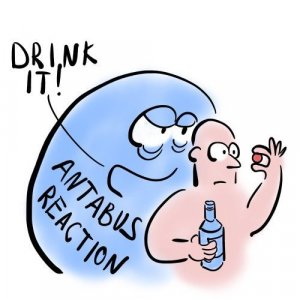Antabuse: Uses and Effects

Antabuse is a drug whose active ingredient is disulfiram. It’s used to treat chronic alcoholism. While it isn’t a cure for alcoholism, it’s a helpful tool that can be used in conjunction with therapy.
Uses and effects of Antabuse

Disulfiram, as we mentioned above, is used to treat chronic alcoholism. You shouldn’t take it for at least 12 hours after drinking alcohol, as it causes unpleasant effects, even when you consume small amounts of alcohol.
Some of its effects include:
- Flushing and headache.
- Nausea and vomiting.
- Chest pain.
- Weakness.
- Blurry vision.
- Confusion.
- Choking and difficulty breathing.
- Anxiety.
When you take Antabuse, the effects will begin within ten minutes after you drink alcohol and could last up to one hour or more.
How to Take it
Antabuse comes in the form of tablets to take orally. You should take one a day, as directed by your doctor. You shouldn’t take more or fewer doses than prescribed, nor for longer than prescribed.
If you have trouble taking the tablets, you can crush them and mix them with juice, water, coffee, or tea.
This article may also interest you: Do You Have to Give Up Alcohol to Lose Weight?
What if I forget to take a dose?
If you forget to take a dose, try to take it as soon as you remember. However, if you remember when it’s time for the next dose, you should continue your regular dosing schedule. It’s important not to take a double dose to make up for the one you forgot.
Special precautions

Before starting this medication, it’s important to determine if you’re allergic to its active ingredient.
Also, you should inform your doctor if you’re taking other medications because they may contain alcohol. It’s also important for your doctor to know if you’re diabetic or suffer from thyroid, liver, or kidney diseases.
In the case of women, it’s necessary to know if the patient is pregnant, is planning to become pregnant, or is breastfeeding. If you get pregnant while taking this medication, you should go see your doctor as soon as possible.
Also, if you’re going to undergo any surgery, including dental surgery, you must inform your specialist that you’re in treatment with disulfiram.
Should you follow a special diet?
While you’re taking Antabuse, you can’t consume any alcoholic drink or drugs that contain alcohol for 12 hours before taking the first dose and for several weeks after you stop taking the drug.
Also, you must be careful with the consumption of sauces, vinegar, and all foods and dishes that may contain alcohol.
Side effects of Antabuse
The possible side effects of this drug are acne, headache, drowsiness, fatigue, and sexual impotence. Also, some patients may experience a metallic or garlic-like taste in their mouths.
However, you must go to your doctor if you experience any of these symptoms:
- Excessive tiredness and weakness.
- Loss of appetite.
- Yellowing of the skin and eyes.
- Dark urine.
Other recommendations if you take Antabuse
You should always carry an ID card that states that you’re taking this medication. It’s a good idea to include the name of your doctor or the hospital or medical center you frequent to contact in case of an emergency.
You must avoid contact with or breathe in any products that contain alcohol, such as paint fumes, dyes, varnishes, and lacquers. Also, try to be careful when you use products that contain alcohol, such as aftershave lotions and colognes. These products, when combined with disulfiram, may cause headaches, nausea, itching, or redness.
Before using a product that contains alcohol on the skin, try it out. For this purpose, apply a bit on a small area of skin for one to two hours. If there’s no redness accompanied by itching or other unwanted effects after this time, you can use the product.
You should also read: 6 Signs of Alcohol Addiction You Shouldn’t Ignore
Conclusion
Although Antabuse isn’t a cure for alcoholism, it reduces the need to drink. It’s used in conjunction with behavior modification, psychotherapy, and counseling to help patients stop drinking.
All cited sources were thoroughly reviewed by our team to ensure their quality, reliability, currency, and validity. The bibliography of this article was considered reliable and of academic or scientific accuracy.
-
Moore, J. N. P. (1955). The treatment of alcoholism. Occupational Medicine. https://doi.org/10.1093/occmed/5.3.86
-
NEWMAN, H. W. (1950). Antabus and the metabolism of alcohol. California Medicine.
-
MORIARTY, J. D. (1950). The use of antabus in the therapy of alcoholic patients. California Medicine.
This text is provided for informational purposes only and does not replace consultation with a professional. If in doubt, consult your specialist.








